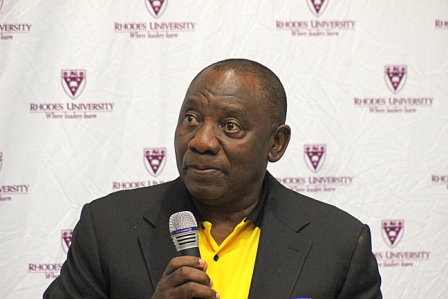

(((This one is the page 1 pic – high res on its way!!!))))
Rhodes University Vice Chancellor Dr Sizwe Mabizela with Deputy President Cyril Ramaphosa who visited Grahamstown on Sunday. He addressed a mostly Rhodes audience in the university’s Barratt lecture theatre in the morning, and an enthusiastic crowd of close to 2 000 in the Indoor Sprt Centre in Joza in the afternoon. Photo: Steven Lang
By STEVEN LANG
Deputy President of South Africa, Cyril Ramaphosa, was adamant that Rhodes University should not be closed. He said that “if you want me to hold a placard that will say ‘Rhodes must stay open’ I will hold it for you”.
Ramaphosa was addressing a question put to him by a representative of the National Health Education and Allied Workers Union (Nehawu) at a question and answer session after he had addressed a gathering of academics, students and workers at the Barratt Lecture Theatre, Rhodes University on Sunday morning 7 May.
Nehawu is currently involved in wage negotiations with the Rhodes administration where the long-term financial viability of the university has been a factor mitigating union demands.
The Nehawu member told the Deputy President that Grahamstown is a poor town and that if the university closes, “the town is dead”. He therefore made a plea, begging Ramaphosa to “’Please make sure that this university stays open”.*
Ramaphosa insisted that although it was his first visit to the university, “you have a friend in me, who will say ‘Rhodes University should not be closed’”.
He pointed out that the Minister of Rural Development and Land Reform, Gugile Nkwinti, who has deep roots in the Grahamstown area had fought a “titanic battle” to ensure that Rhodes University would not be merged with any other academic institution.
Nkwinti was one of three panellists at Ramaphosa’s presentation on Sunday. The others were Noxolo Kiwiet, Speaker of the Eastern Cape Legislature and Enoch Godongwana, ANC head of economic transformation. Luzuko Jacobs, former spokesman for Parliament and current Rhodes PhD student chaired the session.
Ramaphosa let his audience know that he was aware of their concerns. He recalled that only a few days previously a man had been convicted for the murder of Rhodes student, Anelisa Dulaze. He shared the pain of the family who had lost a promising daughter and drama student on her 21st birthday.
He said she was a disciplined child of a family with limited means who had recently learned that she had been offered a bursary to complete her degree. This bitter blow reminded him of a poem by Ingrid Jonker, The child is not dead, that recounted the death of a child who was shot by soldiers in the Cape Town township of Nyanga.
The Deputy President acknowledged the students’ dissatisfaction with the current system of higher education. He said that instead of universities being places of dreams, they had become ivory towers, symbols of privilege and places of exclusion.
He said universities should be reservoirs of knowledge, achievement and shared prosperity, but they had turned into objects of frustration, anger and rage.
Many students felt ignored while they saw the opulence of the state that favoured pomp and ceremony. The country’s leadership was not sensitive to the needs of the people and especially not to the aspirations of its youth. Ramaphosa said the current leaders had become distant from the people as “we have fallen to inappropriate values”.
Ramaphosa recognised that the leaders of South Africa had failed to live up to the dreams of liberation. Using the vocabulary of the economic sector he said, “Our democracy Is not paying dividends… you must demand more from leadership.”
He said students have a right to demand that the country his generation will bequeath to them “should be a South Africa that functions, should be a South Africa that is free of corruption. It should be a South Africa that has not been captured by anyone. If it has been captured it must be captured by you. because it is your South Africa and it is your future”.
He noted the parallel between the students of today who demand that fees must fall and the struggle of their fathers who fought against apartheid. He encouraged the students to insist on their demands so that we can begin the second phase of our transition.
He accepted that his generation of political leaders has done things in government “which could be derailing the democratic project that you bought so much into” and appealed to the students to “reclaim your South Africa”.
Ramaphosa also addressed the students’ concerns about Eurocentric curricula at universities. He told the story of his daughter who is studying architecture at university and complained that they always have to learn about European architecture, whereas she wanted to study African buildings such as those in Timbuktu and the Great Zimbabwe.
He supported his daughter’s aspirations and those of the students who demanded the decolonisation of the subjects taught at university. He appealed to students to work towards a new curriculum that is relevant to the people of Africa.
Read: Cyril charms the City


